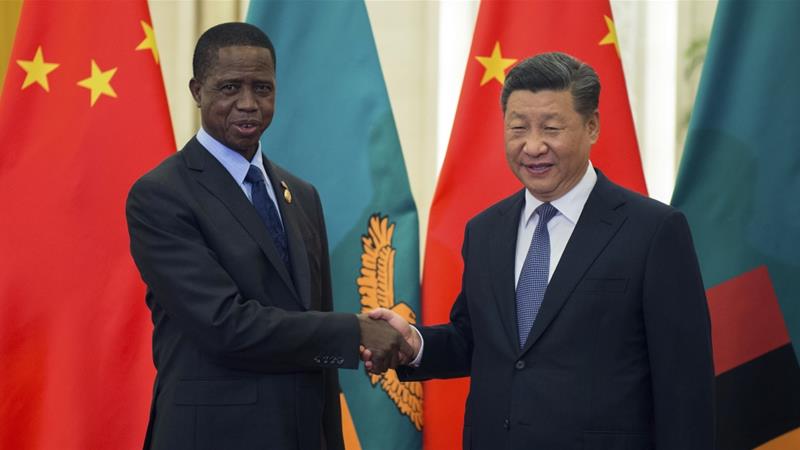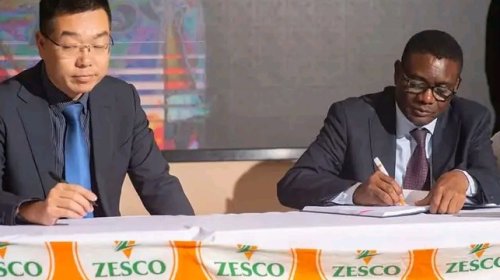A Glimpse into the future of Chinese loan financing in Africa | Zambia’s spiraling debt offers
Zambia is already restructuring, renegotiating or refinancing its extensive Chinese project finance debt, and Chinese companies are playing hardball, according to new research.
Southern Africa’s third-largest economy is under pressure from an impending breakdown of its power supply and its inability to pay for electricity imports, and is staring down the barrel of further defaults on construction project financing and bond payments.
State power utility Zesco revealed last month that a supply shortfall reached 810 megawatts in November, with Zambia and neighboring Zimbabwe both suffering 20-hour per day power cuts due to extreme drought conditions blighting its hydropower output.
Given its spiraling debt profile, Zambia has been unable to tap into its foreign reserves to import power from the likes of South Africa and Mozambique. The country’s sovereign debt is expected to reach 96% of GDP (gross domestic product) in 2020, while the country has defaulted on a spree of loans in 2019.
The most substantial of these was $107 million loan from Italian bank Intesa Sanpaolo to buy two military transport aircraft from Italian aerospace company Leonardo, according to reports from business risk consultancy EXX Africa and local media outlets.
China calling in arrears
China has provided billions of dollars of loans for infrastructure projects to a host of Sub-Saharan African nations as part of its sweeping Belt & Road initiative in recent years, with Zambia one of its most prominent debtors. The Belt & Road is China’s huge investment program around the world and is viewed as an attempt to control a global supply chain and boost economic activity.
In March last year, China Exim Bank threatened that Chinese contractors would suspend work on infrastructure projects in Zambia if arrears were not paid. According to a recent report from EXX Africa, several road construction projects contracted to Chinese firms were suspended late in 2019.

The International Monetary Fund has twice withheld a credit facility amid warnings that Zambia’s high debt and shrinking foreign exchange reserves leave its economy vulnerable. Zambian GDP has halved to just 2% over the past three years, the kwacha currency has depreciated by almost 17% against the dollar over the past year, and inflation is running at almost 10%.
In order to address the country’s economic slowdown, President Edgar Lungu said last year that his government would seek to reduce its domestic arrears and maintain debt within sustainable levels, having already delayed the receipt of loans totaling $2.6 billion contracted in 2018.
Official reports had external debt rising by $10.05 billion at the end of 2018 compared to $8.74 billion a year earlier, but EXX Africa and other independent research institutions have maintained that obligations are likely to be much higher than stated, on account of undisclosed Chinese project finance agreements.
China wants collateral
Zambia is already restructuring, renegotiating, or refinancing its extensive Chinese project finance debt, EXX Africa Executive Director Robert Besseling told CNBC, but evidence of Chinese patience wearing thin extends beyond road construction projects.
“Chinese companies are putting pressure on the Zambian Finance Ministry to avert further delayed payments or defaults on their loans. However, Chinese companies are refusing to restructure existing debts and are instead seeking fresh collateral in case of default,” Besseling highlighted in the report.
Most notably, Chinese firms are seeking to capitalize on the liquidation of Konkola Copper mines, a subsidiary of London-based Vedanta Resources. Zambia is Africa’s second-largest producer of copper.

EXX Africa’s research also highlighted that Chinese companies are seeking control over Glencore’s Zambian operation Mopani, which may be heading towards a sale, and the country’s largest producer, First Quantum Minerals.
The group’s records show that China Civil Engineering Construction Corporation is seeking a restructuring of loan agreements that could involve mining assets being placed as collateral, while Besseling told CNBC that negotiations are likely being conducted by China Exim Bank, Sinosure (China Export & Credit Corporation) and Chinese government officials.
On top of seeking control over Zambian mining assets as debt collateral, China also retains a highly contentious stake in Zambia’s national broadcaster, ZNBC. In 2017, Chinese media conglomerate StarTimes funded the rollout of a migration to a new digital TV signal, and now controls 60% of a joint digital venture with ZNBC, called TopStar.
The venture was also bankrolled by a $232 million loan from Exim Bank, and has been criticized by media watchdogs for allegedly granting excessive influence over the media landscape to Beijing.
Zambian government representatives did not immediately respond to a request for comment. Sinosure, Exim Bank and China Civil Engineering Construction Corporation have also been contacted for comment.
Source: CNBC
![]()





